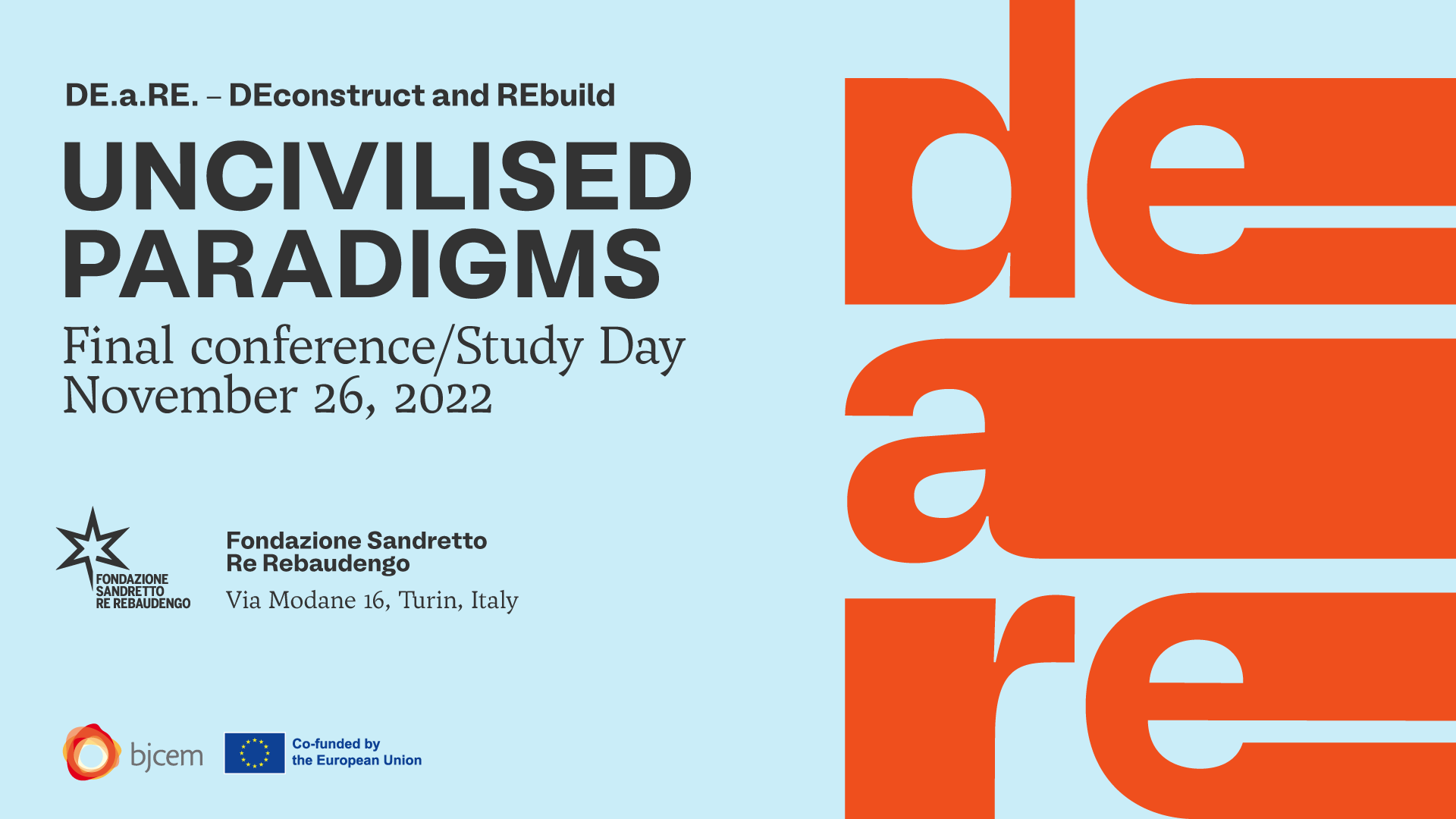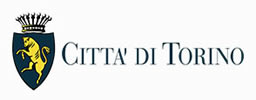
In the framework of the European project DE.a.RE (DEconstruct and REbuild), co-funded by the European Union (Grant Agreement Project 101052900), BJCEM organized a Conference/Study Day, in collaboration with Fondazione Sandretto Re Rebaudengo, in Turin on November 26th, 2022.
The conference is the public final moment of Uncivilised Paradigms, a 50-hours free training that involved 50 fellows and more than 20 lectures, tackling socially engaged practices, New Genre Public Art, critical pedagogy, activism, in dialogue with contemporary artistic practices.
The conference is organized in four panels, curated by the Scientific Committee of DE.a.RE and involves researchers, artists and practitioners contributing to the different topics.
Download here the biographies of the lecturers
The program
8:30 AM – 9:00 AM Welcome coffee
9:00 AM – 9:15 AM
Welcome by Mercedes Giovinazzo (BJCEM President)
Welcome by Bernardo Follini (Curator at Fondazione Sandretto Re Rebaudengo)
9:30 AM – 11 AM
Queering earth(s)
Curated by Simone Frangi
Introduced by Marietta Radomska (online)
With the participation of Evagoras Vanezis, and two fellows of Uncivilised Paradigms: Katerina Kallivrousi and Federico Rudari.
The starting point of the panel is the notion of “flesh of the world” through which late Merleau-Ponty queers the idea of a defined individual body, fluidifies the static massiveness of subjectivity and obliterates the ontological difference between exceptional and masterful human entities (subjects) and the relative ensemble to the other(ed) “things of the world” (objects). Operating on an emergent idea of “interdependent multiples earths” (structured though the contribution of queer phenomenology, deviant ecologies and queer death studies), this panel specifically introduces a deconstructive approach to normative understandings of health, pathology and death in relationship to the current (and not so new) climatic and social deregulation and put forward the necessity of reframing these processes beyond the reductive category of the “owned” individual body.
11:15 AM – 12:45 PM
Learning on a damaged planet
Curated by Denise Araouzou
Introduced by Anna Santomauro
with the participation of Klodiana Millona and one fellow of Uncivilised Paradigms: Iliada Charalambous.
Learning on a damaged planet explores how art institutions can be laboratories for post-disciplinary learning environments at the intersection of ecocentric pedagogies, artistic practices, community-building and climate justice. Artistic practices lend themselves as powerful allies in conceiving and creating tools and narratives for pluriversal worlds. They ‘translate’ information that is more challenging to decipher or embody, from more-than-human worlds and earth system sciences to time and space scales beyond our limited perception. Ours is an entangled world — division and compartmentalisation dynamics of disciplines, institutions, epistemologies and methodologies should be revisited. The act of challenging perceived boundaries often goes hand-in-hand with artistic practices, which is why scholars and educators call for incorporating arts in environmental pedagogies. Where normative education and research practices are not doing enough to elicit transformative action, how can arts contribute and to what end? How can alliances between disciplines be cultivated, what can we learn from them, and what purpose can they serve? What more do we need to know as citizens, communities, and agents of change in this moment of urgency? What skills, knowledge, understanding, and values need to be cultivated? Could methodologies and tools developed within artistic and social collaborative contexts be used to create holistic and ecocentric education models that empower transgenerational learners and doers? What does a cross-pollination of formal and informal pedagogical settings look like? And in what configurations could they be hosted and nurtured within an art institution?
12:45 – 13:45 Lunch break
2 PM – 3:30 PM
Museums in crisis museums and crisis
Curated by Alessandro Castiglioni
Introduced by Hekla Dogg Jonsdottir
With the participation of Marie-Nour Héchaime and one fellow of Uncivilised Paradigms: Hoyee Tse
Do the various crises that our time is experiencing make museums institutions still relevant today? Theirs conservative and exhibition infrastructure, Their hybrid public and private agendas, the relationship with powers and the different needs of self-representation, can be rethought together with institutional global events, artistic contributions, regulatory frameworks and solutions shared with the different territories of reference? The session will try to answer these questions through case studies and the direct contributions of artists, curators and museum practitioner.
3:45 PM – 5:15 PM
Building Critique, Making Space for Change, Repairing the World: Agency and Care in Architecture
curated by Svetlana Racanović
With the participation of Sonja Dragović, Marie Hervé, and one fellow of Uncivilised Paradigms: Carrie Foulkes
The session will focus on critical and ethical reexamination of the practice of architecture for making it the agent of environmentally responsible culture. Architecture will be reflected as eco-ethic-aesthetic (re)articulation of space, as theory and practice qualified to exercise “moral imagination” and support political and social engagement, proficient to respect local/global sustainability and grow environments that would bring collective benefit and foster sense of community, social empathy and ecology of care – equal care for the self and for the others, for human and other-than-human, for cultural and for natural surroundings, for social (human) and the ecological (biophysical). The questions are: how to balance professional/technical competences with ethical decision-making, how to design environments responsibly within vital ecological concerns (ethical design criteria through recognition of environmental ethic), how to escape the logic of profit, exploitation of resources and globalised, instrumentalised, technologised and commodified construction?
6.30 PM
Opening of the exhibition “Every food Is a Landscape”
Polo del ‘900 Sala Voltoni, Palazzo San Daniele, Via del Carmine 14, Torino
Galleria delle Immagini, Palazzo San Celso, Corso Valdocco 4/A, Torino
CONTACT DETAILS
BJCEM Executive Office | Giulia Colletti | digitalcurator@bjcem.org

